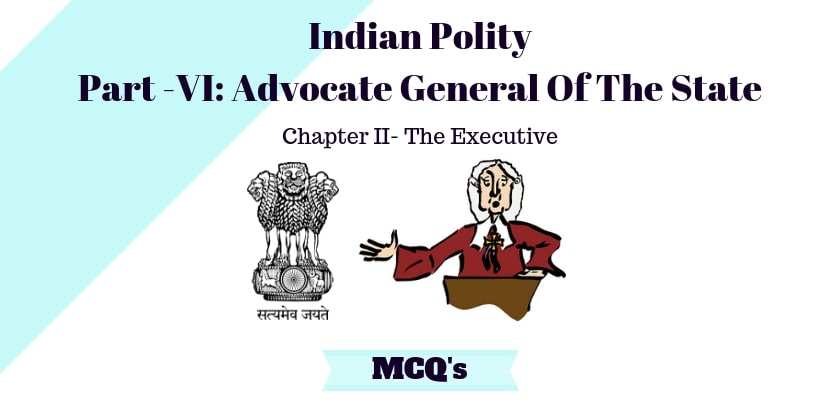Indian polity: Advocate General Of The State
PART VI of the Constitution deals with the States. In which chapter II Article 165 and 177 discuss state’s Advocate General. The State Advocate General is a constitutional post and has been duly appointed as per Article 165 of the Constitution of India.
Difference between Attorney General and Advocate General in Indian Constitution:
The Attorney General is concerned with the Central Government and the President is appointed on the recommendation of the Council of Ministers(CoM) Center. They are assisted by solicitors generals.
The state’s Advocate General is to take care of the law related to that particular state government. He is appointed by the governor of that state on the advice of Council of Ministers(CoM) of that state.
Both posts come under the constitution of India.
Important Points regarding Advocate General of State:
- Advocate General appointed by Governor on the Advice of COM of state and also Submits resignation to Governor.
- He gets dissolved with the dissolving of Government.
- The Advocate General is the first law officer of a State.
- His office and functions are comparable to that of the Attorney General of India.
- He/she must be qualified to be a Judge of the High Court.
- He has the right to attend and speak in the proceedings of either Houses of the State Legislature without any right to vote.
- He has the right of audience in any Court in the State.
Important articles comes under Advocate General:
1. Article 165 – Each State shall have a Advocate General.
2. Article 177 – Right of Audience in State Legislature and its committees but no right to vote.
3. Article 194 – Rights, Privileges and Immunities of Advocate General of India which are available to State Legislature Members.
Part VI – Advocate General: MCQ’s
1. Advocate General of the State is appointed for the period of:
A. 5 years
B. 6 years
C. Decided by the President
D. No fix tenure
[toggle] Answer – D [/toggle]
2. Advocate General of the State submits his resignation to:
A. Chief Judge of the high court of the state
B. Governor of the respective states
C. President of India
D. Chief Minister of the state
[toggle] Answer – C[/toggle]
3. Which article states that each state shall have an Advocate General?
A. Article 194
B. Article 177
C. Article 197
D. Article 165
[toggle] Answer – D [/toggle]
4. Which one is NOT correct regarding Advocate General of State?
A. He has the right of audience in any Court in the State Legislative
B. The Advocate General is the first law officer of a State.
C. He receives the Pay as per fixation by Government.
D. He has the voting right in the state legislature.
[toggle] Answer – D [/toggle]
5. What is the salary of the Advocate General of the State?
A. 90,000/Month
B. 1,20000/month
C. Remuneration not fixed by Constitution
D. As decided by the President
[toggle] Answer – C[/toggle]
6. Who is the highest Law Officer of a State?
A. Attorney General
B. Advocate General
C. Solicitor General
D. Secretary-General Law Department
[toggle] Answer – B[/toggle]
7. The Advocate General will hold office during the pleasure of the:
A. Governor
B. Chief Minister
C. President
D. Chief Justice of the State High Court
[toggle] Answer – A [/toggle]
8. Civil services day is observed on:
A. 23 April
B. 21 July
C. 4 November
D. 21 April
[toggle] Answer – D [/toggle]
9. Which of the following statements is/are correct about Advocate General?
1. The President of India appoints a person who is qualified to be appointed as a Judge of a High Court to be Advocate General for the State.
2. His remuneration is fixed by Constitution.
A. Only 1
B. Only 2
C. Both
D. None
[toggle] Answer – D
Explanation: Advocate General’s remuneration is not fixed by Constitution, but receives the Pay as per fixation by Government.
The Governor of each State shall appoint a person who is qualified to be appointed as a Judge of a High Court to be Advocate General for the State. [/toggle]
10. The legal advisor to the state government is known as:
A. Advocate general
B. Attorney General
C. Solicitor General
D. State Public Prosecutor
[toggle] Answer – A [/toggle]
11. Who advises state Government on legal matters?
A. Attorney general
B. Advocate General
C. Solicitor General
D. Chief Justice of the High Court
[toggle] Answer – B[/toggle]
12. An Advocate General of a State is entitled to appear before:
A. Any court of law within the country
B. Any court of law within the State
C. The Supreme Court of India
D. District and Sessions Courts
[toggle] Answer – B[/toggle]
13. Who among the following is/are not appointed by the President?
A. Attorney General for India
B. Judges of the Supreme Court
C. Judges of High Courts
D. Advocate General
[toggle] Answer – D [/toggle]
14. The remuneration payable to the Advocate General of a State is determined by the
A. Chief Justice of the State High Court
B. Registrar of the State High Court
C. Governor
D. Chief Minister
[toggle] Answer – C[/toggle]
15. the Advocate-General and other members have the right to speak in the Legislative Assembly under the article:
A. Article 165
B. Article 171
C. Article 177
D. Article 179
[toggle] Answer – C
Explanation: Article 177: Every Minister and the Advocate-General for a State shall have the right to speak in, and otherwise to take part in the proceedings of, the Legislative Assembly of the State. [/toggle]

